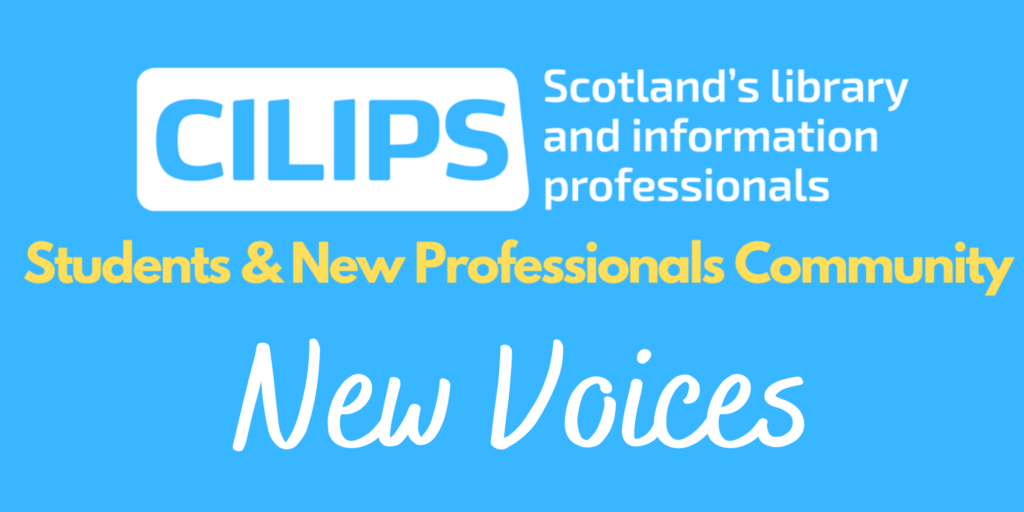New Voices RGU Student Series – Beulah Lowry
Category: Blog, New Voices, New Voices, RGU Student Series 2022
In this 2022 Student Series for the New Voices blog, the CILIPS Students & New Professionals Community will be sharing the views of Robert Gordon University students from the MSc in Information and Library Studies. With special thanks to Dr Konstantina Martzoukou, Teaching Excellence Fellow and MSc Course Leader, for organising these fantastic contributions.
 Today, we’re hearing from Beulah Lowry (@halue_b), who has a BA in English with Publishing and is currently one of the Class Representatives for the MSc ILS course at Robert Gordon University. In their free time, they enjoy language learning and playing the saxophone.
Today, we’re hearing from Beulah Lowry (@halue_b), who has a BA in English with Publishing and is currently one of the Class Representatives for the MSc ILS course at Robert Gordon University. In their free time, they enjoy language learning and playing the saxophone.
IL in HE: How Reflecting Diversity Promotes Agency
Information literacy is ‘knowing when and why you need information, where to find it, and how to evaluate, use and communicate it in an ethical manner’ (CILIP 2004 in Dunne & Sheridan 2012 p.2). It should be considered a university-wide priority. Developing information literacy is an important aspect of the transition into higher education, preparing new students for the expectations of academia, including the requirement to work independently and regulate their learning activities (Løkse et al 2017).
However, learners can be resistant to the idea of information literacy classes — especially when their current skill level is framed as a deficit (Johnson 2003 in Andretta 2005). To make the invitation more welcoming, we may consider ‘rebranding’ classes with a less stigmatised label (e.g., ‘information skills refresh’), while emphasising lifelong learning for staff as well as students.
Of course, such a reframing must be supported by the structure and content of the instruction provided. Without thorough investigation of the factors which presently prevent effective teaching and learning, the programme will quickly regain its old associations. Therefore, it is important to examine staff and student perceptions of information literacy, as well as the diversity of vocational, cultural and learning differences which coexist within the university.
Settling the issue of subject integration
Information literacy is context dependent (Lloyd 2010); information needs vary between, and beyond, accredited professional courses. Classes should be organised at faculty or course level, with explicit links between the skills taught therein and the skills required for graduate working life (Løkse et al 2017). Subject specialist input is therefore advised. When librarians and lecturers communicate and collaborate, the quality of information literacy teaching improves, and with it, student attainment (Yevelson-Shorsher & Bronstein 2018).
Unfortunately, some academics consider information literacy to be an element of initial fitness to study (Løkse et al 2017) – although these expected baseline competencies are rarely examined as part of school-leaving qualifications. In any case, regional high-school based sessions (Belfield and Levin 2008 in Løkse et al 2017) cannot reach all applicants, whereas embedding the information literacy unit in a first-semester module encourages early fulfilment while ensuring that students understand the role of information literacy skills in their chosen discipline (Crawford & Broertjes 2010).
In order to get lecturers on board, evidence must be presented as to the benefits of the unit. For example, it can be argued that because preparation for study is positively correlated with course completion (European Commission 2015 in Løkse et al 2017), it is most pragmatic to support the process. A high completion rate improves the university’s marketability and renews the cycle through the attraction of fresh applicants.
Differences in learning style and life experience
Learning style and prior knowledge are two of the main factors in skills acquisition outcomes. Cultural background has a strong influence on learning styles (Ayeung & Sands 1996 in Matamoros 2016) and attitudes to learning (Guild 2001 in Matamoros 2016), while economic conditions impact the type and amount of academic support that learners receive (APA 2014 in Matamoros 2016). Encouragingly, it has also been found that when culturally relevant scholarship is promoted, and students are exposed, as much as possible, to information professionals from their own cultural background, this has a positive impact (Quiñonez & Olivas 2020).
In addition, it is increasingly likely that incoming higher education students will have prior or ongoing work experience, whether within or outside their preferred discipline. Students now come from a wide variety of schools, both nationally and internationally. This means that they each enter university with a highly individualised skills profile (Matamoros 2016). It is imperative that higher education institutions both anticipate and embrace this diversity; wherever students are empowered to offer their own perspectives and apply extradisciplinary methods to solve problems, they flourish.
Meeting students where they are
The provision of differentiated learning and assessment maximises student success (Matamoros 2016) – but we need not rely on rigid demographic research. Delivered before the commencement of study, anonymous self-report surveys help instructors to recognise the needs of their learners, and to make any necessary adjustments to the material or delivery. Given the right tools, students will readily identify which skills need special attention, and which methods of instruction and assessment best enable their own progress.
As they advance, it is essential for students to be encouraged to revisit the material. Learning tools and face-to-face workshops should be made accessible from enrolment through to the end of each course (Crawford & Broertjes 2010; Madden 2013), and promoted both online and across campus, from the library to the lecture space. This seemingly small example of shared responsibility illustrates the importance of a joined-up approach.
In conclusion, information literacy instruction presents a unique opportunity for academics and information professionals to enhance learning through professional collaboration (Webber, Boon & Johnson 2005). To achieve this, we must meet students where they are, and emphasise how far they will go.
Key points
- Information literacy is a crucial component of effective study
- Emphasis should not be on skills deficit, but rather on personal agency in skills acquisition
- Students require discipline-specific skills development opportunities
- Information literacy teaching must recognise student diversity and reflect this in the materials and modes of delivery
- It is necessary to institute a university-wide prioritisation of information literacy as continuous personal development
Thank you to Beulah for this inspiring investigation into how embracing the diversity of students’ experiences and supporting them to play an active part in the educational experience can serve to strengthen and enrich their information literacy learning.
Stay tuned for more in the 2022 New Voices RGU Student Series coming soon and be sure to check out the rest of CILIPS SNPC’s New Voices blog.
Bibliography
ANDRETTA, S., 2005. Information Literacy: A Practitioner’s Guide. Elsevier Science & Technology, 2005.
CRAWFORD, N. and BROERTJES, A., 2010. Evaluation of a university online Information Literacy unit. The Australian Library Journal, 59(4), pp. 187-196. [online] Available from: https://www.tandfonline.com/doi/abs/10.1080/00049670.2010.10736024 [Accessed 28 November 2021]
DUNNE, S. and SHERIDAN, V., 2012. Developing First Year Student Reflections on the Learning Process. All Ireland Journal of Teaching and Learning in Higher Education (AISHE-J), 4(1) Spring 2012. [online] Available from: http://ojs.aishe.org/index.php/aishe-j/article/view/72 [Accessed 24 November 2021]
LLOYD, A.M., 2010. Information Literacy Landscapes: Information Literacy in Education, Workplace and Everyday Contexts. Oxford: Chandos Publishing, 2010.
LØKSE, M. et al, 2017. Teaching Information Literacy in Higher Education: Effective Teaching and Active Learning. Oxford: Chandos Publishing, 2017.
MADDEN, R., 2013. Information behaviour of humanities PhDs on an information literacy course. Reference Services Review, 42(1), pp. 90-107. [online] Available from: https://www.emerald.com/insight/content/doi/10.1108/RSR-07-2013-0034/full/html [Accessed 26 November 2021]
MATAMOROS, A.B., 2016. Differentiated Instruction in Information Literacy Courses in Urban Universities: How Flipping the Classroom Can Transform a Course and Help Reach All Students. Urban Library Journal, 22(1). [online] Available from: htp://academicworks.cuny.edu/ulj/vol22/iss1/1 [Accessed 19 November 2021]
QUIÑONEZ, T. and OLIVAS, A., 2020. Validation Theory and Culturally Relevant Curriculum in the Information Literacy Classroom. Urban Library Journal, 26(1). [online] Available from: https://search.ebscohost.com/login.aspx?direct=true&AuthType=ip,shib&db=llf&AN=143353744&scope=site [Accessed 26 November 2021]
WEBBER, S., BOON, S. and JOHNSTON, B., 2005. A comparison of UK academics’ conceptions of information literacy in two disciplines: English and Marketing. Library & Information Research (LIR), 29(93), Winter 2005. [online] Available from: https://lirgjournal.org.uk/index.php/lir/article/view/197/242 [Accessed 26 November 2021]
YEVELSON-SHORSHER, A. and BRONSTEIN, J., 2018. Three Perspectives on Information Literacy in Academia: Talking to Librarians, Faculty, and Students. College & Research Libraries, May 2018. [online] Available from: https://web.s.ebscohost.com/ehost/pdfviewer/pdfviewer?vid=10&sid=ba0ff9da-b825-4102-a2b3-b51e20270ca1%40redis [Accessed 27 November 2021]





